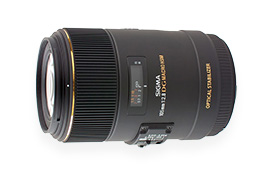First we’ll analyze the lens results when mounted on the Canon EOS 1Ds Mark III and on the Nikon D3x. Then we’ll measure the progress in terms of image quality by comparing the 2011 results with the earlier non-stabilized version, the Sigma 105mm F2.8 EX DG Macro, announced in June 2004.
Finally, we’ll see how this lens stacks up against other macro lenses already tested, giving us an opportunity to revisit the overview of 100mm macros for full-frame cameras that we recently published on this site.
The Sigma 105mm F2.8 EX DG OS HSM put through the DxOMark mill
The Sigma 105mm F2.8 EX DG OS HSM Nikon & Canon, mounted on a Nikon D3x and Canon 1Ds Mark III, respectively
With a DxOMark Score of 23 for the Nikon mount and 24 for the Canon, the two 105mm macros have, for all purposes, identical image quality. (Note : With a T-stop of 3.2 on the Nikon and 3 on the Canon, there is a difference of about 0.19EV at full aperture. The Canon version gains almost 1/3EV over the Nikon version, making the Canon slightly brighter at f/2.8.)
| Strong points | Weak points |
| Excellent sharpness | Strong vignetting, with a loss of 1.5EV in the last 1/3 of the field at f/2.8, and a loss of 0.7EV in the last 1/3 of the field at f/4. |
| No distortion | |
| Reasonable weight | High price |
| Well-corrected chromatic aberrations |
Sigma 105mm F2.8 OS vs Sigma 105mm F2.8: Stabilization – for $300 more
Globally, these lenses provide the same image quality – and in fact, the non-stabilized version controls vignetting better. So at first glance, it may seem that a jump in price of $300 is unjustified, but realistically, stabilization is a genuinely useful feature for a macro lens of this kind. Our advice, then, is to go for the stabilized version (if your budget permits).
Sigma 105mm F2.8 EX DG OS HSM Canon vs Sigma 105mm F2.8 EX DG Macro Canon mounted on a 1Ds Mark III
Sigma 105mm F2.8 EX DG OS HSM Nikon vs Sigma 105mm F2.8 EX DG Macro Nikon mounted on a D3x
Looking at the details, we see:
- Very close DxOMark scores — only 1 point (Canon) and 2 points (Nikon) separate these two lenses
- The stabilized version is ever-so-slightly brighter
- Stronger vignetting (1.5 EV to f/2.8) for the stabilized version
Verdict: After all this time, we frankly hoped for greater advances in image quality. This said, we acknowledge that there’s been at least a little improvement in sharpness and transmittion.
One other good point is that stabilization hasn’t added any more weight to the lens.
Note that the prices for professional-quality Sigma lenses have risen significantly. By raising its prices, however, Sigma has lost some of its advantage over Nikon and Canon in terms of quality-to-price ratio.
The best 100mm macros
Below is a summary of our updated scorecard (available at 100mm macros for full-frame cameras):
For Canon:
- 1st place at 28: Carl Zeiss Makro-Planar T 100mm f/2 ZE Canon.
- 2nd place at 25: Canon EF 100mm f/2.8L Macro IS USM.
- 3rd place at 24: Sigma 105mm F2.8 EX DG OS HSM Canon.
- 4rd place at 23 (tie): Tamron SP AF 90mm F/2.8 Di MACRO Canon and Sigma 105mm F2.8 EX DG Macro Canon.
- 5th place at 18: Canon EF 100mm f/2.8 Macro USM.
With image quality results practically equal to Canon’s series L, the stabilized Sigma is certainly good enough to be considered by fully serious player in this lens catagory.
For Nikon:
- 1st place at 34: Nikkor AF-S VR Micro-NIKKOR 105mm f/2.8G IF-ED.
- 2nd place at 29: Carl Zeiss Makro-Planar T 100mm f/2 ZF2 Nikon.
- 3rd place at 23: Sigma 105mm F2.8 EX DG OS HSM Nikon.
- 4rd place at 22: Tamron SP AF 90mm F/2.8 Di MACRO Nikon.
- 5th place at 21: Sigma 105mm F2.8 EX DG Macro Nikon.








DXOMARK encourages its readers to share comments on the articles. To read or post comments, Disqus cookies are required. Change your Cookies Preferences and read more about our Comment Policy.